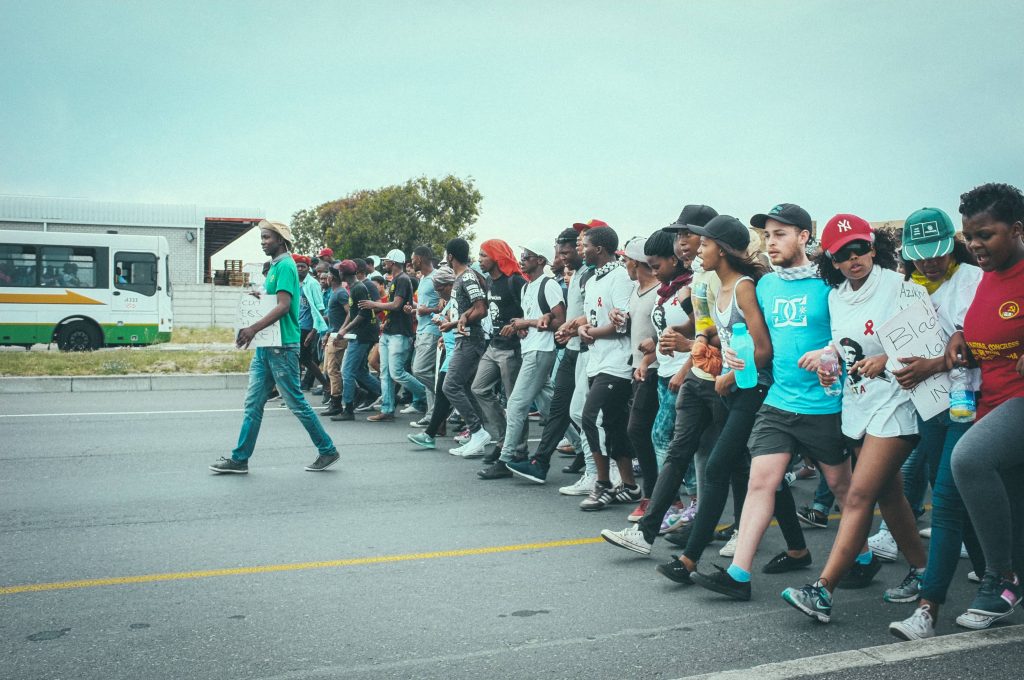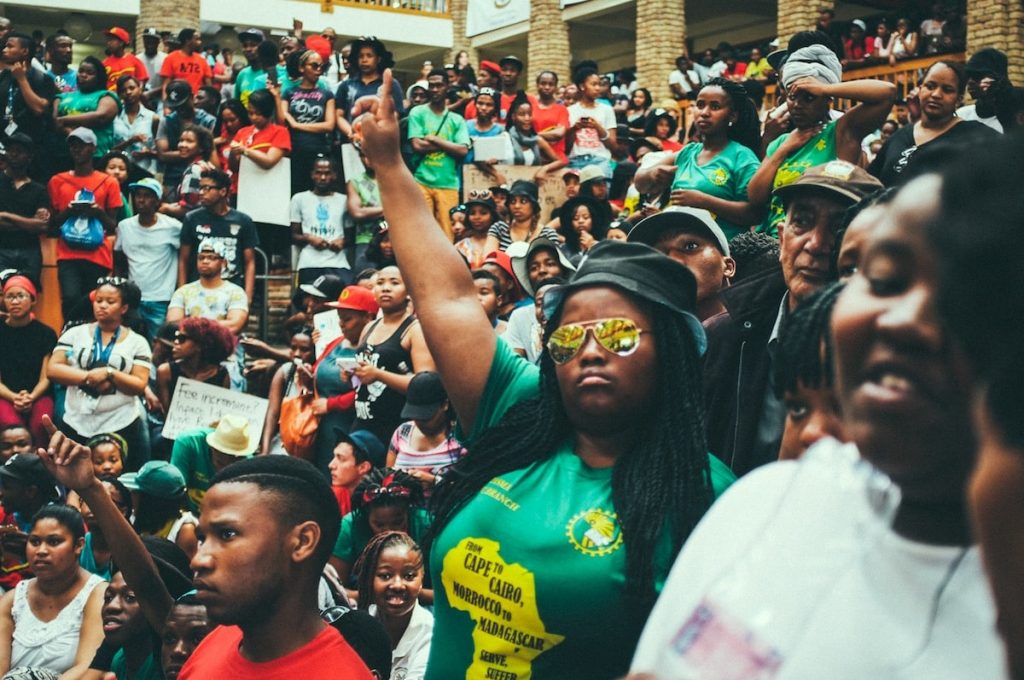South Africa, Post-Trauma
To what extent has South Africa and South Africans failed to address the aftermath of Apartheid, the resonances of which can be felt to this day? To what extent are we living in a post-traumatic space?

Fees Must Fall demonstrators. Photo: Barry Christianson.
In a recent essay published on this site, the political theorist Achille Mbembe painted a compelling picture of the pathologization of black life in South Africa. To be sure, recent events have changed this narrative somewhat, as Mbembe himself has acknowledged. Absent from this current discourse, however, is something that is also frequently absent from the narrative of #FeesMustFall and others protests: To what extent has South Africa and have South Africans failed to address the aftermath of Apartheid, the resonances of which can be felt to this day? To what extent are we living in a post-traumatic space?
In his own research on the postcolony in general, Mbembe argues that African socio-political life is mutually constituted, that our existence and mobility within communities is a product of intersubjective relations. With regards to this, he builds off of thinkers like both Steve Biko and Frantz Fanon, who critically engaged with the ways in which white supremacist ideologies connect skin pigmentation with inferiority. Fanon in particular underscored the importance of embodiment and perception in the construction of socio-political life. The black body in Fanon’s France is “surrounded by an atmosphere of certain uncertainty” (Black Skin, White Masks 110-111). It is a body which, under the white gaze, is “given back…sprawled out, distorted, recolored” (Black Skin, White Masks 113). The project of decolonization is therefore a project to do not so much with the black bodies negating whiteness, but rather with the desire to self-define, to not be over-determined from the outside. The material manifestations of this psychic project are necessarily political since the black body continues to be an ‘object’ of whiteness’ own neuroses. For Fanon, this is a form of trauma, needing to be overcome.
This brings us to a terrain Mbembe seems wary to tread: that of the psyche and the emotions. Academia has a long and abiding suspicion of emotive language. Fanon, however, did not. His philosophical and psychoanalytical observations stemmed directly from his engagement with his personal narrative and those of the many people he treated in clinics in the context of the Algerian liberation struggle. As a therapist, Fanon knew that there are certain dynamics which only come to light via the vehicle of narrative. In the aftermath of the violence of apartheid, perhaps the main form of writing that black South Africans can muster currently is that of narrative and, by extension, the autobiographical. There is nothing remarkable or out of place about this, as many societies have adopted this strategy in the past (e.g. profusion of autobiographical writing on the Holocaust and slavery by survivors and/or their descendants). The insistence on the legitimacy of narrative is thus not so much an “indictment” of whiteness, but rather a condemnation of a politics of mis-remembering and, in some instance, a forgetting of our very recent past. The plurality of black life in South Africa will emerge more easily from these kinds of narratives, rather than from academic modes of writing. I would therefore argue that references to Biko and Fanon are better read as springboards to new grammars of the psycho-social experiences of black citizens.
In a country where empty gestures such as the Truth and Reconciliation Commission (TRC), which solicited forgiveness from the victims of Apartheid and those they left behind, predominate; where static symbols like the Apartheid Museum and the like abound; and exclusive spaces like Robben Island function as tourist destinations rather than as sites of public memory, it comes as no surprise that articulating black pain is still taboo. Let us compare this with the cultural memory of the Holocaust. To this day, children in Germany and various other European countries are taught about the Holocaust at school. There are a multitude of Holocaust Memory projects around the globe and it is the subject of various academic projects. Survivors and their descendants are still the subject of public debate. Their lives and their selves are their testimony. Apartheid is subject to academic discourse, but the cultural memory of Apartheid, as felt in black bodies, is disproportionally invisible in every day life in South Africa. A child can finish school in South Africa without knowing what Apartheid was, what it meant, and how they are located within its legacy. This is why we have teenagers and university students across all racial divides who think it is progressive to have “one black/white friend” or to be “colorblind” (evidence of this can be seen in the #IAmStellenbosch campaign, but is not limited to that particular space). Our amnesia is an indictment of our society at large. This is trauma at work.
Concomitant with the suspicion of personal narrative and the terms of address, Mbembe argues that “a new anti-decorum” abounds and that this is symptomatic of an “age of fantasy and hysteria”. I disagree. The very idea of decorum is intimately bound up with performances of civility, which protect whiteness from a violent confrontation with its own racism. Insofar as whiteness has already established itself as the center, as the source of civilization, it can dismiss expressions that do not conform to the prescribed modes of politeness as barbaric. Far from coming about as a result of expressions of rage and outrage, hysteria and fantasy are already embedded in racism itself. Taking a lead from Fanon, racism itself is a mental disorder or delusion that plays itself out in socio-political life by attempting to control the reality and social existence of others. Whiteness need not seek to “institutionalize itself” because it has already ensured its domination of all avenues of social, political, and economic realms through the dual systems of oppression: colonialism and Apartheid. This domination involves the psychic life of both whiteness and blackness in the communal imaginary of South Africa.
Take a well known episode in the recent #FeesMustFall protests, during which white allies stood as human barricades between the police and black students, thereby highlighting the extent to which white bodies are protected from brutality by their very pigmentation. Greater force was exercised at historically black universities such as Fort Hare and the University of the Western Cape – to name but a few. The trauma is ongoing. Writing in another context, Judith Butler argues that “those who are unreal have, in a sense, already suffered the violence of derealization…if violence is done against those who are unreal, then, from the perspective of violence, it fails to injure or negate those lives since those lives are already negated. But they have a strange way of remaining animated and so must be negated again…and again” (Precarious Life 33). No matter the agent of the violence enacted against black bodies, the meaning behind it is intimately tied up with the reinforcement that black lives do not and cannot matter, precisely because they have yet to be granted the status of human. The numerical dominance of the black population is not enough to dismantle the abiding legacy of dehumanization at the heart of black disavowal in South Africa.
Rather than seeing expressions of pain as redemptive or as a means of gaining coherence with the self and with others, Mbembe instead perceives it as a destructive exercise. But how do we heal if we are not able to express our pain? To be clear, I am not advocating for the acceptance of hate speech and racial hatred. Rather, I’m arguing that black people also need space to feel themselves. Expressions of pain arise not so much out of victimhood, but rather as attempts to make sense of what it means to be a survivor of an unjust past , and to leverage that past to negotiate a more potentially just future. All South Africans are living in a post-traumatic space which, by definition, resists articulation through language. The personal is political precisely because our bodies within this space are still very much politicised. In order to “resume human life in the aftermath of irreparable loss,” as Mbembe puts it, it is necessary to speak about what we have lost. And sometimes to cry, and sometimes to yell.
Perhaps it is the case that our discussions of political life are inadequate precisely because they neglect to factor in the psychological dynamics embedded within political discourse. What would be valuable would be to examine the ways in which the political and the psychological overlap to form a communal imaginary across all racial divides. This kind of work would involve the revision of who we are and who we are in relation to others. I suspect that consciously inserting memorialization into every day life would be a sufficient first step in this process. Until we are able to acknowledge and pay due credence to our respective positionalities in the aftermath of Apartheid, rather than trying to hold on to the delusion of a just society, we will not be able to be amongst others in an ethically legitimate way.






















